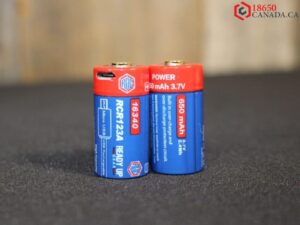As technology advances, rechargeable batteries have become an increasingly popular choice for powering a wide range of devices. While there are many types of rechargeable batteries available, 18650, 26650, and 21700 batteries are among the most commonly used. In this article, we will explore the key features and differences between these three types of batteries to help you choose the right one for your device.
Overview of 18650 Batteries
18650 batteries are named after their dimensions, which measure 18mm in diameter and 65mm in length. These batteries were first introduced by Sony in the early 1990s for use in laptops, and have since become popular for use in flashlights, electric vehicles, and other devices.
One of the key advantages of 18650 batteries is their high energy density, which allows them to store a large amount of energy in a small space. They also have a high discharge rate, meaning they can deliver a lot of power quickly when needed. However, they can be relatively expensive compared to other types of batteries, and their smaller size can result in shorter battery life in some applications.
Overview of 26650 Batteries
26650 batteries are larger and more powerful than 18650 batteries, measuring 26mm in diameter and 65mm in length. They were first introduced in the early 2000s and have since become popular for use in high-drain devices like power tools and electric vehicles.
One of the key advantages of 26650 batteries is their high capacity, which allows them to store more energy than 18650 batteries. They also have a higher discharge rate, making them ideal for devices that require a lot of power. However, their larger size can make them less portable and they can be more expensive than 18650 batteries.
Overview of 21700 Batteries
21700 batteries are a newer type of battery that was first introduced by Samsung in 2015. They measure 21mm in diameter and 70mm in length, making them slightly larger than 18650 batteries. They have quickly become popular for use in electric vehicles, power tools, and other high-drain devices.
One of the key advantages of 21700 batteries is their high energy density, which allows them to store more energy than 18650 batteries while being only slightly larger. They also have a higher discharge rate than 18650 batteries and are more affordable than 26650 batteries. However, they are still relatively new and may not be compatible with all devices.

Key Features and Performance Comparison
When choosing a battery, it is important to consider several factors, including capacity, discharge rate, voltage, size, weight, and cost. Here’s how the three types of batteries compare in these areas:
Capacity: 26650 batteries have the highest capacity, followed by 21700 and 18650 batteries.
Discharge rate: 26650 batteries have the highest discharge rate, followed by 21700 and 18650 batteries.
Voltage: 18650 and 21700 batteries have similar voltage, while 26650 batteries have a slightly higher voltage.
Size and weight: 18650 batteries are the smallest and lightest, followed by 21700 and 26650 batteries.
Cost: 18650 batteries are generally the most expensive, followed by 26650 and 21700 batteries.
Factors to Consider When Choosing Batteries
In addition to the key features and performance factors discussed above, there are several other factors to consider when choosing a battery. These include safety, environmental impact, brand reputation, and compatibility with emerging technologies.
When it comes to choosing a battery, there are several additional factors that you should consider beyond the key features and performance comparison. These factors include safety and reliability, environmental impact and sustainability, brand reputation and warranty, and future-proofing and compatibility with emerging technologies.
1. Safety and Reliability
Safety should always be your top priority when choosing a battery. Low-quality batteries may have safety issues like overheating, leakage, or even explosions. That’s why it is important to choose high-quality batteries from reputable manufacturers that have been certified to meet safety standards such as UL, CE, or ROHS. Additionally, look for batteries that have built-in safety features like overcharge and over-discharge protection, short circuit protection, and temperature control.
2. Environmental Impact and Sustainability
The environmental impact of batteries is a major concern, as many batteries contain toxic materials that can harm the environment if not disposed of properly. Look for batteries that have a low environmental impact and are made from recyclable materials. Some manufacturers also offer recycling programs for their batteries, making it easier to dispose of them in an environmentally friendly way.
3. Brand Reputation and Warranty
The reputation of the battery manufacturer is also important when choosing a battery. Look for batteries from well-known, reputable brands that have a good track record of producing high-quality batteries. In addition, check if the manufacturer offers a warranty or guarantee for their batteries. A good warranty can provide peace of mind and protect you from defects or other issues that may arise.
4. Future-Proofing and Compatibility with Emerging Technologies
Finally, consider future-proofing and compatibility with emerging technologies when choosing a battery. As technology evolves, new devices and technologies may require different battery sizes, capacities, and voltages. Look for batteries that are compatible with emerging technologies and are likely to remain relevant in the future. This can help you avoid having to replace your batteries frequently as new technologies emerge.
Final Thoughts
When choosing a battery, it is important to consider a range of factors beyond just the key features and performance comparison. Safety, environmental impact, brand reputation, and future-proofing are all important considerations that can help you choose the best battery for your needs. By taking these factors into account, you can ensure that you are getting a high-quality battery that will provide reliable, long-lasting power while also being safe and environmentally friendly.

